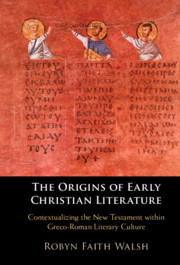 The Origins of Early Christian Literature
The Origins of Early Christian Literature The Gospels, the Satyrica, and Anonymous Sources
Published online by Cambridge University Press: 23 January 2021
Having demonstrated a more plausible social context for the gospel writers in the previous chapter, Chapter 4 establishes how many of the features of the gospels traditionally associated with their exceptionalism – for example, anonymity or consulting eyewitnesses – can be understood as evidence of rhetorical strategy and literary influence. By comparing the Synoptic gospels to the Satyrica, in particular, we see how these writings were in dialogue with the literary interests of the age in subjects like funerary meals, crucifixion, resurrection, and so forth.
To save this book to your Kindle, first ensure [email protected] is added to your Approved Personal Document E-mail List under your Personal Document Settings on the Manage Your Content and Devices page of your Amazon account. Then enter the ‘name’ part of your Kindle email address below. Find out more about saving to your Kindle.
Note you can select to save to either the @free.kindle.com or @kindle.com variations. ‘@free.kindle.com’ emails are free but can only be saved to your device when it is connected to wi-fi. ‘@kindle.com’ emails can be delivered even when you are not connected to wi-fi, but note that service fees apply.
Find out more about the Kindle Personal Document Service.
To save content items to your account, please confirm that you agree to abide by our usage policies. If this is the first time you use this feature, you will be asked to authorise Cambridge Core to connect with your account. Find out more about saving content to Dropbox.
To save content items to your account, please confirm that you agree to abide by our usage policies. If this is the first time you use this feature, you will be asked to authorise Cambridge Core to connect with your account. Find out more about saving content to Google Drive.